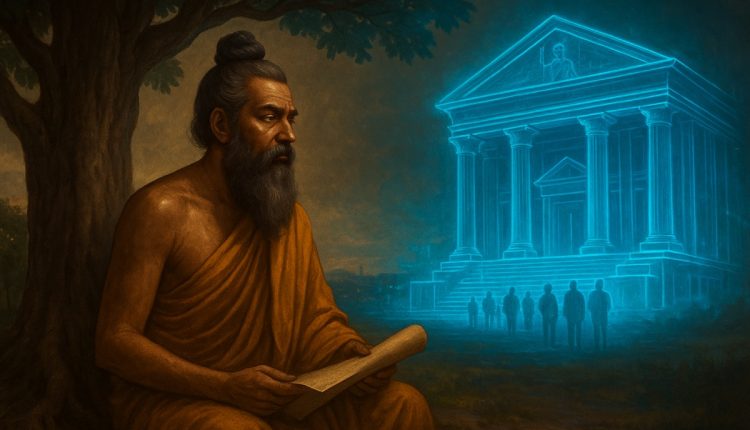In a world where social fault lines deepen and institutions lose public trust, the wisdom of Vidura Niti, rooted in the Mahabharata, provides ageless counsel on fairness and justice. King Dhritarashtra’s advice by Vidura stresses ethical rule, equal treatment, and the law of the land. Amidst the turbulence of 2025—characterized by technology disruption, economic disparity, and cultural polarization—Vidura’s precepts are as strikingly relevant as ever.
Vidura also stressed access to justice, claiming, “A king who denies his subjects the means to seek redress invites rebellion.” In 2025, this tenet is paramount because economic constraints keep many from seeking legal redress. Legal aid systems tend to be underfunded, and low-income people are exposed to exploitation, either by rapacious landlords or exploitative employers. Practical implementation requires more money for public defenders and community legal clinics. Digital platforms can democratize access even more—online portals providing free legal counsel or mediation services could empower marginalized groups, from rural farmers in India to gig workers in cities. By reducing barriers, societies can ensure Vidura’s dream of justice as a universal right, not a privilege.
Vidura, the wise counsellor of Hastinapura, saw justice as the pillar of a successful society. He counselled, “Righteousness is the root of happiness, and justice is its fruit.” For Vidura, justice was more than just enforcing the law, but an embodiment of dharma—a moral order which balances the rights of individuals with the common good. Fairness, he believed, called for impartiality, compassion, and accountability, particularly from the authorities. In 2025, these values ring true as we struggle with systemic injustices, from discriminatory algorithms in AI systems to unequal access to resources in a post-pandemic world.
One of Vidura’s central principles is non-bias in dispensing justice. He warned against favouritism, declaring, “A ruler who bends the law for kin or allies sows the seeds of chaos.” Today, this means ensuring that legal and institutional mechanisms work without prejudice. For example, criminal justice systems across the globe are criticized for racially biased sentencing or based on socioeconomic status. Governments in 2025 must invest in reforms such as open sentencing guidelines and bias training for police officers using Vidura’s principle. Technology also needs to be in harmony with justice in predictive policing or recruitment needs to be audited stringently to remove discriminatory trends, making sure that justice remains blind to irrelevant differences.
Vidura also stressed access to justice, claiming, “A king who denies his subjects the means to seek redress invites rebellion.” In 2025, this tenet is paramount because economic constraints keep many from seeking legal redress. Legal aid systems tend to be underfunded, and low-income people are exposed to exploitation, either by rapacious landlords or exploitative employers. Practical implementation requires more money for public defenders and community legal clinics. By reducing barriers, societies can ensure Vidura’s dream of justice as a universal right, not a privilege.
Empathy, another of Vidura’s fundamental ideas, is essential to fairness. He exhorted leaders to “feel the pain of the afflicted as their own.” This appeal for sympathy is particularly relevant in 2025, when global issues such as climate dislocation and economic instability amplify hardship. Locally, empathy-based governance might involve putting mental health assistance at the top of the list for communities emerging from economic or social trauma, so that justice heals instead of punishing.
Accountability, Vidura held, is the foundation of trust in government. “A leader who shirks his responsibilities weakens the sacredness of the law,” he cautioned. In 2025, the principle demands leaders to confront institutional breakdowns forthrightly. Corporate accountability is an urgent problem—tech companies, for instance, exercise uncharted leverage over data privacy and public debate. Recent scandals, such as illicit data collection, underscore the need for tighter regulation and enforcement. Governments should pass legislation holding corporations accountable for trust violations, consistent with Vidura’s emphasis on accountability for those who betray public interest. Likewise, public officials should be subject to open scrutiny, whether by independent anti-corruption agencies or citizen mechanisms, to preserve confidence in the rule of law.
Vidura’s words also highlight the need for anticipatory justice—preventing harm before it becomes a festering wound. He counselled, “A wise ruler uproots the causes of injustice, not merely its symptoms.” In 2025, this anticipatory approach is essential in tackling root causes such as poverty and education inequalities.
The significance of Vidura Niti in 2025 is that it adapts to contemporary challenges while retaining connection to universal principles. Justice and fairness, as Vidura perceived, involve reconciliation of tradition and innovation. Blockchain technology, for instance, would be able to guarantee transparent land records in developing countries, avoiding conflicts and respecting property rights. Restorative justice programs, based on compassion, had the potential to lower recidivism by prioritizing rehabilitation over punishment, as enunciated by Vidura in his appeal for humane governance. These uses show that ancient wisdom can shed light on modern solutions, bringing past and future together.
But bringing Vidura’s ideals into practice requires communal will. People must insist on accountability, rulers must set dharma ahead of expediency, and institutions must practice transparency. In an era of polarisation, the generation of discourse
across fault lines—ideological, cultural, or economic—must become an imperative to guarantee that justice must reach everyone, not only the mighty. Vidura’s wisdom tells us that fairness is a journey and not a destination that calls for ongoing effort, perseverance, and moral fibre.
Vidura Niti offers us a roadmap for a just and equal society as we stand at the crossroads of 2025. The rule of law can be upheld in ways that address the issues of our time by embracing impartiality, accessibility, empathy, accountability, and visionary governance. Let’s pay attention to Vidura’s wise words so that justice is a lived reality where everyone is treated with respect and all laws serve the common good rather than being an abstract ideal. Therefore, we honour the universal truth that a society founded on equity is a society that endures.
Let Vidura’s wisdom guide us: Justice thrives when fairness binds us…


Comments are closed.